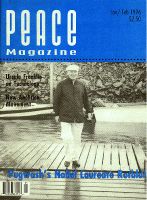
Peace Magazine Jan-Feb 1996, page 5. Some rights reserved.
Search for other articles by various here
The militaries in many countries have ousted elected civilian governments. Canada is among those fortunate states to take pride in their military in two world wars and in U.N. peacekeeping operations. Until the Somali incidents, our military and our government rarely collided.
With the end of the Cold War, many peace activists sensed a need to modify the rule of the Canadian military and considered ways to redefine their functions, enhancing their ability to defend our borders and using them to manage disasters such as flood, fire, oil spills, sabotage and terrorism. But since the Somali outrages I keep recalling a seminar of five years ago when two military officers sketched a disturbing future of Canadian forces. Their core assumption seemed to be that for the military, government wishes eventually would no longer have the force of directives, but would be evaluated and acted upon - or not -after considering their appropriateness in military terms.
I wondered what oaths and undertakings were being required of people as they entered military service, and what advice they were receiving concerning their roles. My colleagues in Science for Peace did not seem very interested in this question.
I fully understand the military's objections to obeying unreal, impractical, or irresponsible requests by a civilian federal government. I also see a need for mutual consideration of the possible results of military actions. But I would fear any independence in the military that would allow them not to execute the will of our elected government. A military with such an attitude might eventually cease merely reacting to the government and become proactive in their decisions. It is then but a short step toward subverting the separation of government and military. At some point the military could endanger the whole of civilian life as regards our rights and liberties.
After the Somali affairs, with the apparently selective token imprisonment of one soldier, the dismissive attitude regarding the guilt of his superiors, the evasion by the Canadian high command of major responsibility for such acts, and the allegations concerning neo-Nazis in the army, I believe we need a close investigation of the Canadian military and the federal government's attitude toward it. Such an investigation should report on the need for adherence to an oath of allegiance to the Canadian Constitution, and specify the duties and lines of authority of the military. I would like to read the views of readers on these questions in Peace Magazine.
Alan Weatherley, Queen's County, N.B.
Pat Kipping's reaction (page 21, this issue) to my article "Hold The Government Accountable For Media Violence" in the Sept/Oct 1995 issue, is an over-statement. I did not write that "media education is no solution to the problem of television violence." An editor chose this subtitle. Nevertheless, I disagree with Kipping's view that media literacy is the only effective way to deal with TV violence.
Media literacy is an essential strategy in a cultural climate where corporate market values rule. But to over-emphasize its potential effectiveness among the young, in an era when children's principal story tellers are no longer parents, teachers, religious leaders, or the community, but a shrinking number of decision makers in large media conglomerates with something to sell, is to absolve the media industry of the kind of responsibility demanded of parents and teachers.
Much of the media literacy resource material currently being embraced by teachers is funded by industry as a public relations strategy. It places the onus exclusively on parents and teachers and implying that television is unfairly blamed.
The Canadian Teachers Federation, Federation of Women Teachers of Ontario, and their counterparts in other parts of the world have repeatedly stated that it is now up to adults to address the problem of media violence. Media literacy is now needed more than ever before as a component of public education. In this way, adults might better understand the magnitude of the growing social and mental health crisis, where media violence is increasingly used as a cheap industrial ingredient because it sells well and translates easily into any language on a global market.
The cultural environment is currently drifting out of democratic reach, while the industry uses outdated notions of freedom of expression and censorship as excuses for unbridled greed. Unless teachers understand this component of media literacy and challenge these trends, they will actually remain part of the problem.
On these matters, I invite readers to consult my recent doctoral thesis, The Treatment of Media Violence in Canada Since Publication of the LaMarsh Commission Report in 1977. It is in the U. of Toronto Department of Education Library, in the National Library in Ottawa or through purchase from me: $55 cerlox, $80 cloth bound, plus $5.00 postage.
Rose Anne Dyson. Toronto.

Peace Magazine Jan-Feb 1996, page 5. Some rights reserved.
Search for other articles by various here